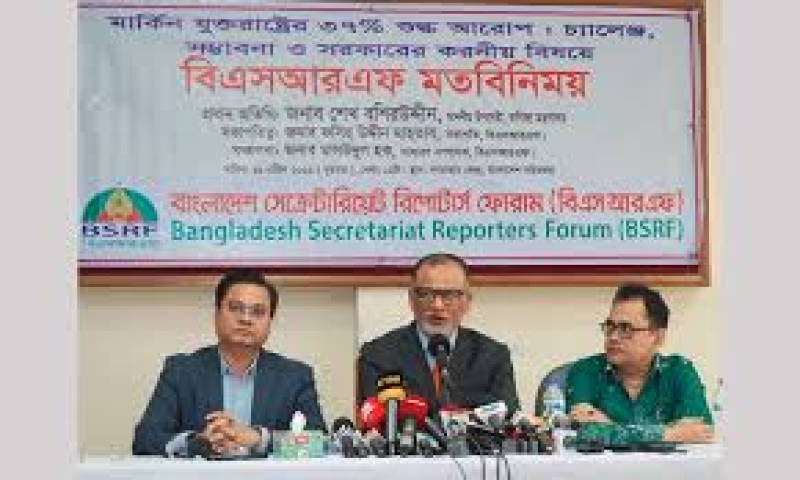- Israel Strikes Tehran with US Support Amid Nuclear Tensions |
- India Sees 9% Drop in Foreign Tourists as Bangladesh Visits Plunge |
- Dhaka Urges Restraint in Pakistan-Afghan War |
- Guterres Urges Action on Safe Migration Pact |
- OpenAI Raises $110B in Amazon-Led Funding |
Bashir Optimistic About Resolving US Tariff Dispute

Commerce Adviser Sk. Bashir Uddin expressed confidence in resolving the ongoing US reciprocal tariff issue, emphasizing that efforts are being made under the direct guidance of the Chief Adviser and with a focus on leveraging Bangladesh’s economic potential and trade capabilities.
“The Chief Adviser is closely involved in this matter, and as part of the Advisers' Council, we are holding regular discussions with relevant parties,” Bashir stated during a meeting today at the Bangladesh Secretariat. The session, organized by the Bangladesh Secretariat Reporters Forum (BSRF), was attended by BSRF President Fasih Uddin Mahtab, with General Secretary Masudul Haque moderating.
Bashir’s remarks come amid heightened concerns over the 37% reciprocal tariff imposed by the US. US President Donald Trump recently agreed to delay tariffs on most nations for 90 days, signaling a potential opening for more favorable negotiations.
In response, Chief Adviser Professor Muhammad Yunus had earlier written to Trump, requesting a three-month delay in implementing the reciprocal tariffs on Bangladesh. Bashir revealed that a delegation, including Special Envoy Lutfey Siddiqi, Commerce Secretary Mabubur Rahman, and Finance Adviser, will visit the US next week to engage with relevant US agencies, such as the USTR, to explore potential solutions.
Following their trip, Bashir intends to visit the US to meet with his counterparts, presenting more targeted proposals. “We are hopeful that, under the Chief Adviser’s directives, we can resolve this issue while maximizing the economic and trade strengths of our nation,” he said. “Our approach will be aligned with sound economic policies.”
Regarding efforts to address the trade deficit with the US, Bashir highlighted the government's initiatives to regulate the prices of animal feed and soybean oil and improve infrastructure, which would bolster the competitiveness and quality of Bangladeshi products, ultimately narrowing the trade gap.
Bashir also underscored the broader goals of the interim government, led by Professor Yunus, which include establishing "insaf" (justice) and improving the country's economic stability. He reported that the government had cleared over Taka 50,000 crore in foreign liabilities in recent months, while inflation was steadily declining and expected to fall to around 6% by mid-year, as indicated by the central bank Governor.
Responding to a question about Bangladesh’s trade relationships, Bashir reiterated his commitment to diversifying trade partnerships. “We have no issue trading with India, China, or Pakistan; what matters most is advancing Bangladesh’s interests,” he asserted.
On the issue of India’s withdrawal of the transshipment facility, Bashir emphasized that the government was working on mitigating the additional costs involved, which could amount to around Taka 2,000 crore. He assured that the government was taking measures to stabilize inflation by diversifying markets and improving supply chains.
As for rising edible oil prices, Bashir indicated that the government is boosting local production and fostering competition to stabilize the market, reducing reliance on imports and minimizing revenue losses from duty preferences.
"We remain hopeful that the edible oil market will stabilize, although I can't specify exactly when," he concluded.

